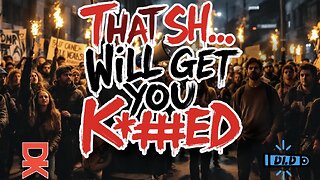Premium Only Content

Did 'every conspiracy theory' about Twitter turn out to be... true
The internal company documents offer a behind-the-scenes glimpse at how the federal agencies distorted the public debate one of the world's largest social media platforms.
CORRECTION: This article originally described Nostr as a "blockchain-based social media site." Nostr is an open protocol that allows users to transmit a post over a decentralized network of relays using cryptographic keys.
The so-called Twitter Files, written by a group of independent journalists given access to internal company documents, offer a behind-the-scenes glimpse at how the federal government shaped the flow of information on one of the world's largest social media platforms.
Some tech pundits say that the Twitter Files contain no secrets: they knew about the thousands of takedown requests the company receives every month from law enforcement agencies and the courts, or they had already opined about the immense challenges of content moderation. However, the Twitter Files have brought important new information to light. They show that the company stifled debate over important policy issues by shadowbanning certain accounts for no good reason and then misleading the public. They show that Twitter was routinely strongarmed by the White House and the FBI into complying with frivolous takedown requests. And they provide evidence that the intelligence community likely influenced the decision to suppress the Hunter Biden laptop story during Joe Biden's 2020 presidential campaign.
"Almost every conspiracy theory that people had about Twitter turned out to be true," Elon Musk said on the All-In Podcast in late December. "Is there a conspiracy theory about Twitter that didn't turn out to be true?"
Conspiracy theorists are often sloppy with the facts and exaggerate what actually happened. But the information brought to light by the Twitter Files should be alarming to anyone who cares about free speech and a free society. Is the government meddling similarly with YouTube, Facebook, Instagram, and Google search? How can we prevent the internet from becoming a centralized apparatus through which state actors shape and censor public debate? Here are three major takeaways from the Twitter Files:
CORRECTION: This article originally described Nostr as a "blockchain-based social media site." Nostr is an open protocol that allows users to transmit a post over a decentralized network of relays using cryptographic keys.
The so-called Twitter Files, written by a group of independent journalists given access to internal company documents, offer a behind-the-scenes glimpse at how the federal government shaped the flow of information on one of the world's largest social media platforms.
Some tech pundits say that the Twitter Files contain no secrets: they knew about the thousands of takedown requests the company receives every month from law enforcement agencies and the courts, or they had already opined about the immense challenges of content moderation. However, the Twitter Files have brought important new information to light. They show that the company stifled debate over important policy issues by shadowbanning certain accounts for no good reason and then misleading the public. They show that Twitter was routinely strongarmed by the White House and the FBI into complying with frivolous takedown requests. And they provide evidence that the intelligence community likely influenced the decision to suppress the Hunter Biden laptop story during Joe Biden's 2020 presidential campaign.
"Almost every conspiracy theory that people had about Twitter turned out to be true," Elon Musk said on the All-In Podcast in late December. "Is there a conspiracy theory about Twitter that didn't turn out to be true?"
Conspiracy theorists are often sloppy with the facts and exaggerate what actually happened. But the information brought to light by the Twitter Files should be alarming to anyone who cares about free speech and a free society. Is the government meddling similarly with YouTube, Facebook, Instagram, and Google search? How can we prevent the internet from becoming a centralized apparatus through which state actors shape and censor public debate? Here are three major takeaways from the Twitter Files:
-
 LIVE
LIVE
Slightly Offensive
4 hours ago $1.04 earnedCandace REDPILLS the Masses in BOMBSHELL Theo Von Interview | Guest: Shane Cashman
1,332 watching -
 UPCOMING
UPCOMING
DLDAfterDark
41 minutes agoDLD Live! That Sh... Will Get You K***ed! What To Consider in SHTF
-
 LIVE
LIVE
megimu32
4 hours agoON THE SUBJECT: IRL Streamers Attacked & Nostalgic Animal Movies That Made Us Cry
472 watching -
 1:00:54
1:00:54
The Tom Renz Show
7 hours agoMore Epstein/FBI, a Scary Trade War, & the Dem Echo Chamber
7.49K1 -
 40:43
40:43
Kimberly Guilfoyle
8 hours agoDems Double Down on Delusion-Why? Live with Tony Kinnett & Bo French | Ep.202
77.8K35 -
 1:28:42
1:28:42
Redacted News
6 hours agoBREAKING! SOMETHING BIG IS HAPPENING IN EUROPE ALL OUT WAR IS COMING AGAINST RUSSIA, TRUMP FURIOUS
121K291 -
 47:50
47:50
Candace Show Podcast
7 hours agoBREAKING: Judge Makes Statement Regarding Taylor Swift's Text Messages. | Candace Ep 155
113K120 -
 1:14:23
1:14:23
Josh Pate's College Football Show
4 hours ago $0.29 earnedCFB’s Most Hated Teams | FSU & Clemson Future | Big Ten Win Totals | Star Rankings Overrated?
14.5K -
 1:33:47
1:33:47
CatfishedOnline
5 hours agoGoing Live With Robert - Weekly Recap
27.8K -
 55:18
55:18
LFA TV
1 day agoEurope’s Sudden Turn Against America | TRUMPET DAILY 3.6.25 7PM
32.2K3